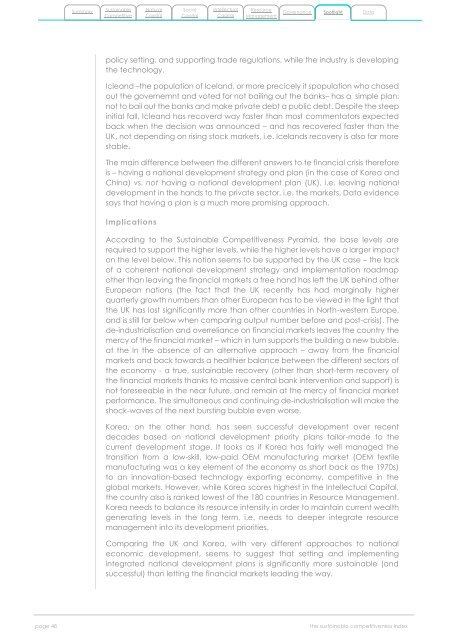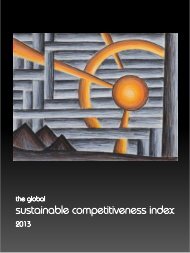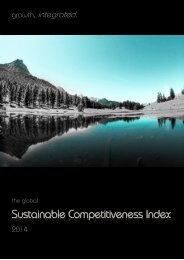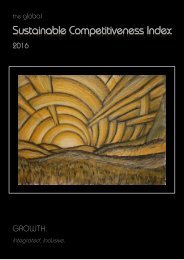The-Global-Sustainable-Competitiveness-Index-2015
Create successful ePaper yourself
Turn your PDF publications into a flip-book with our unique Google optimized e-Paper software.
Summary<br />
<strong>Sustainable</strong><br />
Competitive<br />
Natural<br />
Capital<br />
Social<br />
Capital<br />
Intellectual<br />
Capital<br />
Resource<br />
Management<br />
s<br />
Governance<br />
Spotlight<br />
Data<br />
policy setting, and supporting trade regulations, while the industry is developing<br />
the technology.<br />
Icleand –the population of Iceland, or more precicely it spopulation who chased<br />
out the governemnt and voted for not bailing out the banks– has a simple plan:<br />
not to bail out the banks and make private debt a public debt. Despite the steep<br />
initial fall, Icleand has recoverd way faster than most commentators expected<br />
back when the decision was announced – and has recovered faster than the<br />
UK, not depending on rising stock markets, i.e. Icelands recovery is also far more<br />
stable.<br />
<strong>The</strong> main difference between the different answers to te financial crisis therefore<br />
is – having a national development strategy and plan (in the case of Korea and<br />
China) vs. not having a national development plan (UK), i.e. leaving national<br />
development in the hands to the private sector, i.e. the markets. Data evidence<br />
says that having a plan is a much more promising approach.<br />
Implications<br />
According to the <strong>Sustainable</strong> <strong>Competitiveness</strong> Pyramid, the base levels are<br />
required to support the higher levels, while the higher levels have a larger impact<br />
on the level below. This notion seems to be supported by the UK case – the lack<br />
of a coherent national development strategy and implementation roadmap<br />
other than leaving the financial markets a free hand has left the UK behind other<br />
European nations (the fact that the UK recently has had marginally higher<br />
quarterly growth numbers than other European has to be viewed in the light that<br />
the UK has lost significantly more than other countries in North-western Europe,<br />
and is still far below when comparing output number before and post-crisis). <strong>The</strong><br />
de-industrialisation and overreliance on financial markets leaves the country the<br />
mercy of the financial market – which in turn supports the building a new bubble.<br />
at the In the absence of an alternative approach – away from the financial<br />
markets and back towards a healthier balance between the different sectors of<br />
the economy - a true, sustainable recovery (other than short-term recovery of<br />
the financial markets thanks to massive central bank intervention and support) is<br />
not foreseeable in the near future, and remain at the mercy of financial market<br />
performance. <strong>The</strong> simultaneous and continuing de-industrialisation will make the<br />
shock-waves of the next bursting bubble even worse.<br />
Korea, on the other hand, has seen successful development over recent<br />
decades based on national development priority plans tailor-made to the<br />
current development stage. It looks as if Korea has fairly well managed the<br />
transition from a low-skill, low-paid OEM manufacturing market (OEM textile<br />
manufacturing was a key element of the economy as short back as the 1970s)<br />
to an innovation-based technology exporting economy, competitive in the<br />
global markets. However, while Korea scores highest in the Intellectual Capital,<br />
the country also is ranked lowest of the 180 countries in Resource Management.<br />
Korea needs to balance its resource intensity in order to maintain current wealth<br />
generating levels in the long term, i.e. needs to deeper integrate resource<br />
management into its development priorities.<br />
Comparing the UK and Korea, with very different approaches to national<br />
economic development, seems to suggest that setting and implementing<br />
integrated national development plans is significantly more sustainable (and<br />
successful) than letting the financial markets leading the way.<br />
page 48<br />
the sustainable competitiveness index








